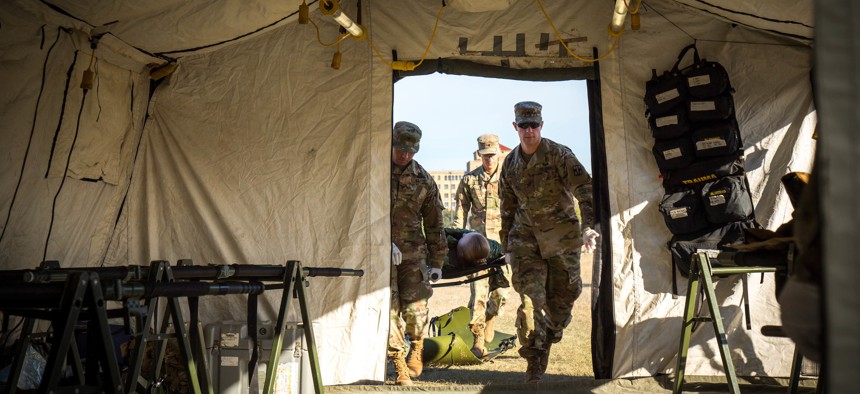Army’s new plan to ‘transform’ soldier healthcare with tech

An Army demonstration of a real world MEDEVAC mission at MacArthur Field, Joint Base San Antonio, Fort Sam Houston, Texas. U.S. Army
Service leaders will boost research into synthetic blood, quantum computing, and more.
The Army wants to dramatically change the way it provides health care to soldiers by accelerating research in a variety of emerging technologies, from using quantum computing that can better detect and treat chronic illnesses to developing synthetic blood, according to newly released plans.
Army Futures Command, charged with synchronizing the service’s modernization efforts, outlined how the Army plans to update its health system and overall approach to medicine across six critical areas, from training to policy, by 2035.
The goal of the strategy, which is dated May but was released Thursday, is to “fundamentally transform” the Army Health System to one that integrates autonomous technologies and predictive artificial intelligence tools to improve decision making, Lt. Gen. James Richardson, acting commanding general for Army Futures Command, wrote in the document’s introduction.
Richardson wrote that Army medicine has “continuously placed new technology on top of existing doctrine” for decades but that is “no longer adequate.”
In the document, Army leaders name research priority areas, including humanistic intelligence, which would build on artificial intelligence and machine-learning research to make human-machine teaming a more “seamless integration.”
Medical research was only one of six areas–including governance, policy and authorities, facilities, training, and global health–in which the Army expects to see significant changes as modern warfare incorporates more technological advancements.
According to the document, the Army also plans to focus resources in biotechnologies that “improve human form or functioning in excess of what is necessary to restore or sustain health.” That includes investments in genetic manipulation, such as genome editing, as well as developing methods that disrupt biological processes, biosensors and informatics, and robotics.
Another research priority listed is synthetic biology, which aims to improve medical care through the development of synthetic blood products or improved burn treatments, and exploring uses for additive manufacturing to create on-demand pharmacies and biologically-derived medicines.
The document feeds into the Army’s overall modernization strategy. Ideas laid out in the medical modernization strategy are expected to trickle into other areas, such as Army Health System doctrine, policy, training and education, materiel, organization, facilities, and personnel.



